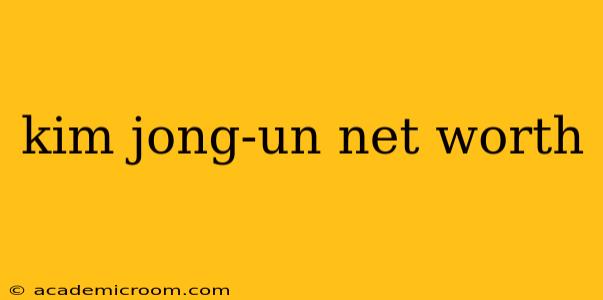Estimating the net worth of Kim Jong-un, the Supreme Leader of North Korea, presents a significant challenge. Unlike publicly traded companies or individuals who disclose financial information, Kim Jong-un's wealth is shrouded in secrecy, making accurate calculations virtually impossible. The lack of transparency surrounding North Korea's economy and the regime's opaque financial dealings makes any figure purely speculative. However, we can explore the factors that contribute to the immense power and likely substantial wealth associated with his position.
How is Kim Jong-un's Wealth Estimated?
Determining Kim Jong-un's net worth relies heavily on indirect estimations, focusing on the resources controlled by the North Korean state and the leader's access to those resources. This includes:
-
Control over State Assets: As Supreme Leader, Kim Jong-un effectively controls the entirety of North Korea's economy, including its natural resources (minerals, timber), industries (mining, manufacturing), and agricultural output. While the exact value of these assets is unknown and likely undervalued due to sanctions and economic mismanagement, their collective worth is substantial.
-
Access to Foreign Currency: Despite international sanctions, North Korea engages in illicit activities, such as arms sales and the production of counterfeit goods, generating significant, albeit undeclared, foreign currency revenue. A portion of these illicit earnings likely flows to the regime's elite, including Kim Jong-un.
-
Luxury Goods and Spending: While concrete figures are unavailable, reports and observations of Kim Jong-un's lifestyle – including his use of private jets, luxurious residences, and extravagant personal spending – suggest a significant personal fortune, even if its exact value remains unknown.
What are the Challenges in Assessing Kim Jong-un's Wealth?
The secrecy surrounding North Korea's financial affairs makes any estimate highly uncertain. The following factors significantly impact the accuracy of any calculation:
-
Opacity of North Korean Finances: The lack of transparency in North Korea's financial records makes it impossible to track the flow of funds or accurately assess the value of state assets.
-
Sanctions and Illicit Activities: The sanctions imposed on North Korea complicate financial tracking, as the regime engages in secretive and illicit activities to circumvent them.
-
Personal vs. State Assets: It's difficult to distinguish between assets held by the state and those personally controlled by Kim Jong-un. His wealth is inextricably linked to the wealth of the nation.
What is the commonly cited figure for Kim Jong-un's Net Worth?
Various sources have attempted to estimate Kim Jong-un's net worth, ranging from tens of millions to billions of dollars. However, these figures should be viewed with extreme caution, given the limitations and challenges outlined above. They are largely educated guesses based on limited, often unreliable, information. There's no verifiable, independently confirmed figure.
Is there any information on Kim Jong-un's investments?
Due to the extremely secretive nature of the North Korean regime and its financial dealings, there is no publicly available information about Kim Jong-un’s personal investments. Any alleged investments would likely be extremely difficult to track and verify given the sanctions and lack of transparency.
What are the sources of wealth for Kim Jong-un and the North Korean elite?
The primary source of wealth for Kim Jong-un and the North Korean elite is their control over the state apparatus. This includes access to and control of the nation's natural resources, industries, and foreign currency earnings (both legitimate and illicit). This systemic control, rather than specific investments or business ventures, forms the foundation of their wealth.
In conclusion, while speculation about Kim Jong-un's net worth abounds, a precise figure remains elusive. The inherent secrecy and lack of transparency surrounding North Korea's financial system prevent any definitive assessment. The focus should shift from attempting to quantify an unknowable number to understanding the systemic mechanisms that allow the North Korean elite to maintain their power and access to resources.
